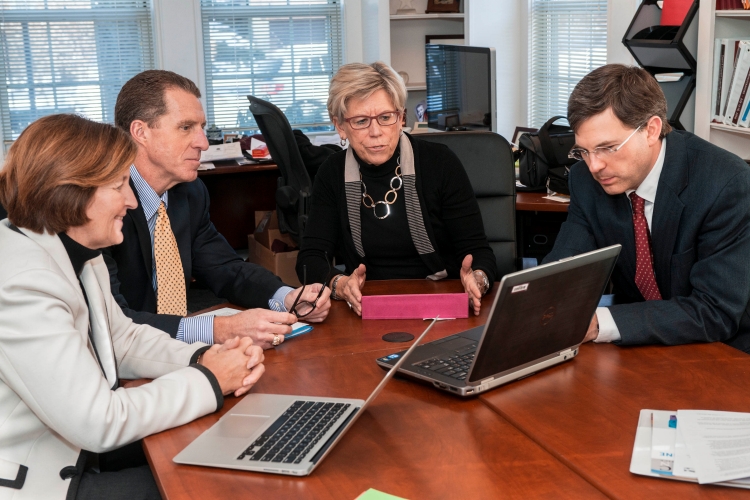
By
The speaker in the Yawkey Center’s Murray Room looked out over a gathering of Catholic school principals, business managers, advancement directors and board members and asked a straightforward question.
“Do you have a cash reserve?”
The response: a few nervous chuckles, very few raised hands.
The attendees were on campus for the latest workshop in the Emmaus Series, an initiative of the Roche Center for Catholic Education that works to strengthen the management skills and professional network principals need to build exceptional Catholic schools.
The question from guest speaker Adam Krueckeberg, the associate dean for finance and administration at the School of Theology and Ministry, highlighted one of the overarching themes of the workshop, which was titled “Mission-Driven Finances for Catholic Schools.”
If Catholic schools are going to survive, they are going to have to embrace a range of best practices used by leading non-profit and for-profit organizations.
According to Krueckeberg, it’s not simply a question of fiduciary responsibility, but one that goes to the core mission and ministry of Catholic schools in an era of declining enrollment, school closures and consolidations and increased competition from public and charter schools.
“This is the mission of the Church, especially in Boston given the difficulties over the past 12 years,” said Krueckeberg, who earned an MBA and an MA in pastoral ministry from BC in 2012. “I see Catholic schools as one of the best ways the Church serves the world, but also one of the best forms of evangelization.”
To fulfill that mission, Catholic schools need to embrace financial planning, data analysis, and transparency, then support those practices with a team of administrators, teachers and parents.
Some ideas, like opening up the budgetary process to the eyes of parents, mark departures from the traditional approach of many schools and parishes.
Josie Citta, principal of Trinity Catholic Academy in Southbridge, said the parents at her school welcomed a new, open budgeting process.
“It was so well received,” she said. “If you’re honest with people and give them the respect of knowing you trust them with the information, it makes a big difference. They know they can trust you.”
To support making these types of changes, the 40 principals in the two Emmaus cohorts don’t attend the workshops alone, according to Roche Center Executive Director Patricia Weitzel-O’Neill. They bring teachers, support staff, pastors and board members to the workshops, which focus on helping schools meet the new National Standards and Benchmarks for Effective Catholic Elementary and Secondary Schools, which Weitzel-O’Neill helped to craft in 2011.
In addition to developing core teams within the schools, Emmaus strives to create a professional network the principals can rely on, either in person or through an online social network, said Kristin Melley, the Roche Center’s associate director for professional development.
“We’re trying a new approach,” said Melley. “We recognize these educators know a lot already. We try to help draw that knowledge out and bring it into contact with as many people as possible.”
The two-year-old Emmaus Series is the latest BC program designed to bring together principals for leadership development. The Roche Center’s Leadership Team Initiative (LTI) tackles many of the same issues as Emmaus. BC’s Lynch Leadership Academy (LLA) brings together public, charter and Catholic school principals.
Tom Nunan Jr., the head of school at Brighton’s Saint Joseph Preparatory High School, attends LTI and is also part of this year’s LLA cohort. He said it’s crucial to bring school leaders together and break down the barriers – whether real or perceived – that have prevented them from collaborating with their peers.
“Whether it’s LTI or Emmaus, it’s crucial to break down the sense that we are always in competition with each other – be it for students, or teaches or donors,” Nunan said during a recent campus visit. “Catholic school principals have a lot to learn from each other and I think that can enhance the brand of Catholic education for all of us.”



